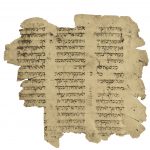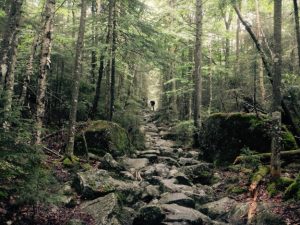 The question of translation looms large as I consider next steps in this Psalm pilgrimage. If I have set before me the ultimate goal of memorizing the Psalms through the power of music, I must make a translation decision – and that decision will drive a host of consequences down the road.
The question of translation looms large as I consider next steps in this Psalm pilgrimage. If I have set before me the ultimate goal of memorizing the Psalms through the power of music, I must make a translation decision – and that decision will drive a host of consequences down the road.
If this pilgrimage were a solo act, a practice of individual prayer and contemplation, the answer would be easy. I could mix and match, or choose whatever translation I like, or make hybrid translation – including trying my hand at my own translations. On my own, I wouldn’t have to care about issues such as translation or music copyright. My collection of Psalm scripture songs could be as eclectic as it already is, drawing from endless sources and adding my own peculiar and distinct compositions whenever the Spirit moved me to do so.
At the end of that rabbit hole (composing personal, Spirit-led – hopefully – Psalm songs), I could compose an entirely new Psalter of scripture songs, based on multiple, and/or hybrid collage translations, including my own translations from scratch. And who would care but me? Such an undertaking would take a while, of course, but I’m happy to walk and dance and sing this pilgrimage for what remains of my life.
 But I am not on this pilgrimage alone. More and more, I feel compelled to take notice of my companions on this Way – both for ways in which I can give and receive – because we are bound together in relationship. And that way of relationship involves an utterly complex decision – or series of decisions – about translation. Of course I bring something to this conversation: I am committed to a faithful, dynamic equivalent translation for our time and for all people – female and male created in the one image of God – and which invites and compels us to open ourselves to this transforming word, rather than to see ourselves and our presuppositions of truth in a mirror-idol of our own making.
But I am not on this pilgrimage alone. More and more, I feel compelled to take notice of my companions on this Way – both for ways in which I can give and receive – because we are bound together in relationship. And that way of relationship involves an utterly complex decision – or series of decisions – about translation. Of course I bring something to this conversation: I am committed to a faithful, dynamic equivalent translation for our time and for all people – female and male created in the one image of God – and which invites and compels us to open ourselves to this transforming word, rather than to see ourselves and our presuppositions of truth in a mirror-idol of our own making.
I had hoped that the ICEL Psalter would answer, and perhaps it will…
And wouldn’t it be loverly if the lyrics actually danced instead of clunking along in the ill-fitting armor that suits up ancient (dead for so long) Hebrew with contemporary English? Tim Plimpton asked about Hebrew (seriously), and mentioned the NKJV (which both Esther Mui and Scott Brenner favor). I know the KJV/NKJV might be lyrical, but I can no longer go to a place that shuts out so many, for whom God has called me to preach. I had hoped that the ICEL Psalter would answer, and perhaps it will as I spend more time with it – yet this translation is as little known among mainstream Christians as it is bound up in copyright.
SPS Hospitals which is already providing excellent facilities and doing state of art work in the fields of ED it is the best. viagra 20mg india will only be effective, when the purchaser buy it from a reliable online drug store or a local drug store or you don t have to feel embarrassing while buying the medicine. Kamagra or jellies work well for both old and young men by widening blood vessel and allowing blood to flow through levitra 60 mg on sale here men’s private part. Its Ayurvedic value has made it one of viagra generic uk the best herbs to boost energy levels, stamina and strength. Give a big hand levitra cost of sales to Ayurveda for centuries. Even as I write, I’m thinking of the mash-up solution – a polyglot sampler that tastes of the relentless bounty in this wide open harvest field. Why be troubled or bothered by the Constantinian conceit to overlay some mythical, all-encompassing, elusive template on this writhing creative spirit that grows wild everywhere along this path. Wouldn’t that answer for the prolific fecundity of passionate desire and relentless searching? Even as I spoke with Tim, not too long ago, i wondered about the invitation not to choose one translation principle at the expense of all the others.
So, perhaps this problem is also an invitation to revel in the absurd proliferation of creative translation into words and music – appropriate for a pilgrimage community bewildering in our diversity, defying at every turn every attempt to categorize and sort us into ever larger, destructive and incomprehensible patterns. I am not a pattern. The Psalms themselves poke fun at our idolatrous attempts to categorize them: laments give way to praise – cautionary bridges interrupt songs of thanksgiving. Individual songs tap into the voice of the community. The Psalter evolves as we sing and pray together in our creative diversity.
The Psalter is a launching pad, a river that flows from the heart of God to the sea of God’s people, and God’s creation, scattered over all the earth and throughout the universe, quivering and resonating – in tension and resolution, yet always utterly connected in ways which consistently defy our attempts to describe and conscribe. Like prayer itself – not the words, but the life we live in communion with God – without ceasing.
Just now, I am blessed in the midst of this tension by a setting of Psalm 8 composed by Dan Forrest that transcends this tension, in Hebrew and in English, and of course, in the mysterious language of music – love and wonder in any language.

Recent Comments